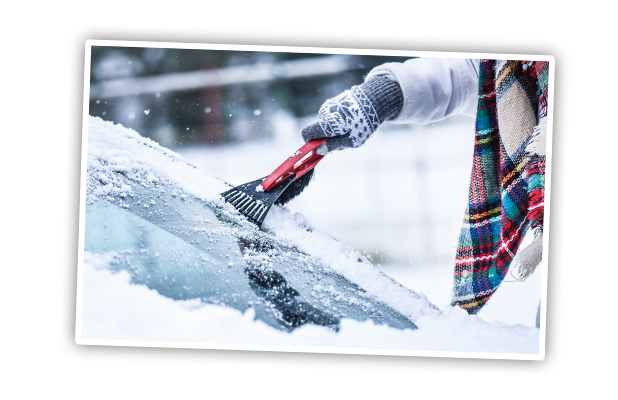Unpredictable winter weather can seriously impact your travel plans and daily commute. The best way to stay safe is to be prepared. See our safety tips below to keep you safe and prepared on the road this winter:
Driving Safely:
• Always clear any excess ice and snow from all parts of your vehicle before driving, including the roof. Additionally, keep your windshield, headlights, and brake lights clear of ice and snow at all times.
• Brake gently to avoid skidding.
• Reduce your speed and allow extra time to stop on slippery, snow-covered roads
• Be cautious on bridges and overpasses as they tend to freeze before other roadways.
• Leave earlier, allowing extra time to reach your destination, accounting for slower travel if necessary.
• Even four-wheel drive and all-wheel drive vehicles can encounter trouble on winter roads, so drive cautiously and keep extra space between you and the vehicle in front of you.
Be Prepared with Your Own Winter Vehicle Emergency Kit:
• Snow brush & ice scraper: An essential tool for clearing off snow and ice from your vehicle.
• First aid kit: This is crucial if someone is injured, allowing you to assist until help arrives.
• Emergency roadside flares or reflective safety markers: In addition to using your fourway flashers, utilizing flares and safety markers will help you stay visible in an emergency. It will also help signal other motorists that you may be in distress and need assistance – getting you help faster.
• Sand, rock salt, or cat litter: In the event your vehicle gets stuck, spread the sand, salt, or cat litter around your tires to help regain traction.
• Flashlight and batteries: Winter brings shorter days and darker commutes. In the event of an emergency, stay visible to other drivers by holding a flashlight.
• Cell phone charger: Your cell phone will be needed in an emergency; don’t let a low or dead battery prevent you from calling for help.
• Jumper cables: Cold weather can reduce the life of your vehicle’s battery. Keep jumper cables on hand in the event your car battery dies.
• Small shovel: This will be handy for moving snow away from your vehicle.
• Gloves, hats, & blankets: Prepare yourself for the worst. If you must leave your vehicle in an emergency or are waiting in a cold car for help to arrive, stay warm by bundling up with blankets, a hat, and gloves.
• Food/snacks: Roadside assistance might take longer to arrive during a severe storm. Keep water and a supply of snacks in your vehicle to help you stay hydrated and to maintain body heat. Snacks can especially be handy if you have children with you, as it may help keep them calm while you wait for help to arrive.